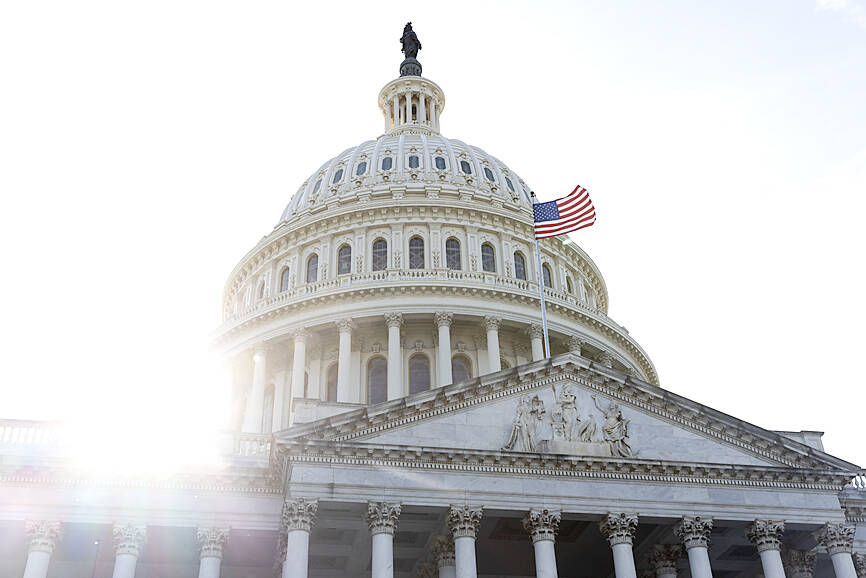The US Senate Committee on Foreign Relations on Thursday approved a bill mandating the US Department of State to review and update its policy guidance on Taiwan every five years due to the ever-changing geopolitical situation and growing risk of a Chinese invasion.
The Taiwan assurance implementation act was introduced by Republican US Senator John Cornyn and Democrat US Senator Chris Coons on March 3.
The US House of Representatives in 2023 overwhelmingly passed a bill of the same name, which authorized the US secretary of state to review the guidelines on exchanges with Taiwan and submit a report to the US Congress every two years.

Photo: EPA-EFE
The version proposed by Cornyn and Coons includes more detailed provisions, such as amending the Taiwan Assurance Act of 2020, regularly reviewing the “Guidelines on Relations with Taiwan” and related documents, and reissuing guidance to executive branch departments and agencies.
After completing its review, the state department must submit a report to both the US Senate Committee on Foreign Relations and the US House Committee on Foreign Affairs within 90 days.
“Our commitment to Taiwan must be backed by an approach that evolves with the changing realities in the Indo-Pacific,” Coons said in a statement issued earlier this month.
Meanwhile, Cornyn said the legislation would help reinstate a strong Taiwan strategy at the state department.
“The threat China poses to the stability of the Indo-Pacific, including our friend and ally Taiwan, is ever-evolving, and our diplomatic guidance must be able to keep up,” he said.
The bill must be passed by both the Senate and the House of Representatives before it is signed into law by the US president.
A bipartisan group of House lawmakers introduced a counterpart bill late last month, but the voting schedule has not yet been announced.

NATIONAL SECURITY THREAT: An official said that Guan Guan’s comments had gone beyond the threshold of free speech, as she advocated for the destruction of the ROC China-born media influencer Guan Guan’s (關關) residency permit has been revoked for repeatedly posting pro-China content that threatens national security, the National Immigration Agency said yesterday. Guan Guan has said many controversial things in her videos posted to Douyin (抖音), including “the red flag will soon be painted all over Taiwan” and “Taiwan is an inseparable part of China,” while expressing hope for expedited “reunification.” The agency received multiple reports alleging that Guan Guan had advocated for armed reunification last year. After investigating, the agency last month issued a notice requiring her to appear and account for her actions. Guan Guan appeared as required,

Japan and the Philippines yesterday signed a defense pact that would allow the tax-free provision of ammunition, fuel, food and other necessities when their forces stage joint training to boost deterrence against China’s growing aggression in the region and to bolster their preparation for natural disasters. Japan has faced increasing political, trade and security tensions with China, which was angered by Japanese Prime Minister Sanae Takaichi’s remark that a Chinese attack on Taiwan would be a survival-threatening situation for Japan, triggering a military response. Japan and the Philippines have also had separate territorial conflicts with Beijing in the East and South China

A strong cold air mass is expected to arrive tonight, bringing a change in weather and a drop in temperature, the Central Weather Administration (CWA) said. The coldest time would be early on Thursday morning, with temperatures in some areas dipping as low as 8°C, it said. Daytime highs yesterday were 22°C to 24°C in northern and eastern Taiwan, and about 25°C to 28°C in the central and southern regions, it said. However, nighttime lows would dip to about 15°C to 16°C in central and northern Taiwan as well as the northeast, and 17°C to 19°C elsewhere, it said. Tropical Storm Nokaen, currently

PAPERS, PLEASE: The gang exploited the high value of the passports, selling them at inflated prices to Chinese buyers, who would treat them as ‘invisibility cloaks’ The Yilan District Court has handed four members of a syndicate prison terms ranging from one year and two months to two years and two months for their involvement in a scheme to purchase Taiwanese passports and resell them abroad at a massive markup. A Chinese human smuggling syndicate purchased Taiwanese passports through local criminal networks, exploiting the passports’ visa-free travel privileges to turn a profit of more than 20 times the original price, the court said. Such criminal organizations enable people to impersonate Taiwanese when entering and exiting Taiwan and other countries, undermining social order and the credibility of the nation’s